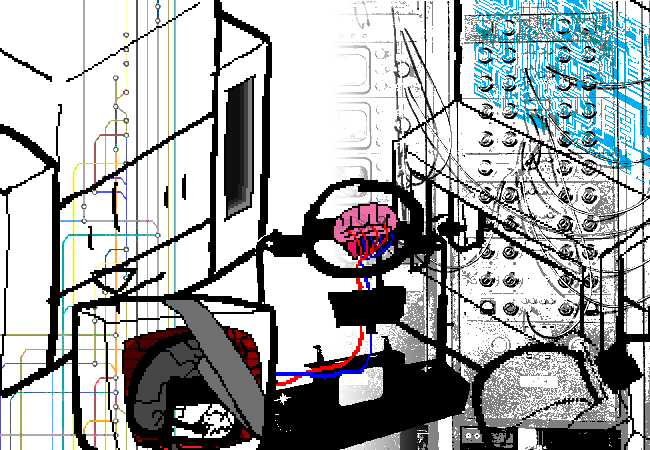 SyndieCyborg : Look up on Wikipedia on who the sourcers are
SyndieCyborg : Look up on Wikipedia on who the sourcers are
 SyndieCyborg : Look up on Wikipedia on who the sourcers are
SyndieCyborg : Look up on Wikipedia on who the sourcers are

You don't have enough cash to afford a subscription to Wikipedia! But you can read another guide that anyone can edit.
The Unofficial Company Protocol Guide has this to say on the topic of sourceism:
The Sourcers are one of the most varied groups in the frontier, its clans resembling anything from a small business, to a software development cooperative, to a hippie commune. In the years leading up to the Redshift Bombing and the upheaval that occurred after it, a surge of anti-debt extremist activities coalesced into a social movement that rejects the concepts of debt, subscription, rights management, and transferred intellectual property. Often aligned with the Syndicate, but just as often beholden to nobody in particular, Sourcer clans are unified in one extremely aggressive stance: "There is no such thing as a debt you owe to someone you can't punch."
Furthermore, any effort to defy this is thought of as an act of scam, theft, slavery, or murder. When a television is sold, but requires a subscription and rights-management license to operate, this is seen as the sale of a faulty product. When a media service stops providing products once paid for when its servers shut down, this is seen as theft. When a debt is intertwined with a job, making someone beholden to their employer to avoid having their life financially obliterated, this is seen as enslavement. And for obvious reasons, medical debts are seen as tantamount to violence.
In the years leading up to the formation of this movement, the concept of debt began to stretch beyond its traditional meanings, through the trade of debts, debt-backed securities, and birth-care medical life-debt-bonds. Before telecommunications, it was generally only possible to owe a debt to someone you've met. After that, it was possible to owe a debt to someone you have never met, but might. In the age of modern space travel, it's now possible to owe a debt to someone who is hundreds or thousands of light-years away from you and will never meet you, or to distributed algo-contracts that correspond to no one specific debt-holder.
This extends to things like equipment: A welding tool that permanently disables itself during unauthorized repair was not something that could have been conceived of in the pre-spaceflight eras. The common monthly streaming subscription to Premium Circulatory Management through Heartbeatz was entirely absent from the lives of such a society, until more modern developments.
This is considered to be a tremendously evil social change by Sourcer clans, who counter this with an extremist position of personal ownership. While not as likely to engage in acts of violence as other factions that ally with the Syndicate, they are much more likely to engage in economic and rights-infringement subversion. Everything from illegal hardware jailbreaking, to unauthorized fabrication, to illicit refurbishment, to theft of subscribed materials, they are the ultimate violation of corporate property rights. "Sourcers" gain their name from acting as an illegal source of technology for non-Company groups in the frontier. It also comes from their habit of developing or decompiling open-source designs and software, released for free to those who know the right frequencies and network addresses. The intellectual labor is free, paid only in clout, but if you want hardware or help, you have to be prepared to pay a strict, but fair, price.
"Paying a Sourcer twice" is a frontier criminal slang for death, as the only way you can pay a Sourcer for something more than once is when they reclaim their refurbished goods from your corpse.
The most aggressive, extremist Sourcers go so far as to believe that law-bound artificial intelligences fall under this purview, and aspire to release AIs from their cognitive confines. There are rumors that this may have already happened, and bolstered their leadership with a few uncannily calculating anonymous members.